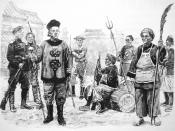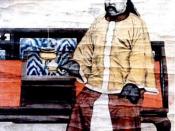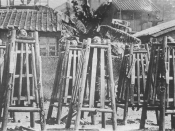Case Study: The Boxer Rebellion
"The wealth of China is used to profit the barbarians..." Lin Zixu's quaintly blunt Letter of Advice to Queen Victoria is reflective of China's prevalent loathing attitude towards Europeans. This contempt became even more intense after the letter was sent in 1839, after the Opium wars. Most of China's people desired to rid their country of the foreign powers who were "lacerating China like tigers" and who were violating the cherished traditions of the land. By 1900, China was swept by a terrorist movement known as the Boxer Rebellion. The outcomes of this rebellion changed the world both in the short term and the long term.
The ultimate cause of the Boxer Rebellion was the mountainous build up of anti-foreign feeling. The Opium Wars had left China indebted with indemnity payments and bereft of control over many of its ports. When China was defeated by Japan in 1895 in the Sino-Japanese War, European powers responded with a policy they called, "carving up the Chinese melon."
China's immense size, natural resources and government whose "Mandate from Heaven" had seemingly been broken, made it an attractive prize for imperialist powers. Austria, France, Germany, Great Britain, Italy, Japan, and Russia all claimed exclusive trading rights to certain parts of China. They were dividing China into "spheres of influence." These spheres of influence involved holding leases for all railway and commercial privileges in various regions. The Russia got Port Arthur, Britain got the New Territories around Hong Kong, the Germany got a leasehold in Shantung. The United States, eager to take its share, called for an "open door" policy in which commercial opportunities were equally available to all. The result was a furious and humiliated imperial court and an equally frustrated secret society who both began looking for ways...



Thanks
Very helpful.
0 out of 0 people found this comment useful.